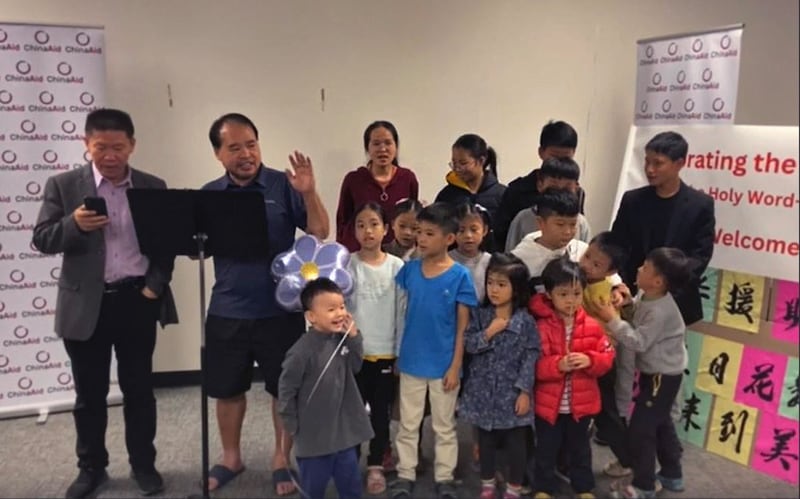Dozens of members of a persecuted Protestant church in China have arrived in the United States after escaping the country via Thailand, where they were also detained by the immigration authorities amid fears of repatriation.
The Mayflower Church members touched down in Dallas on Good Friday after a coordinated effort from advocacy groups and politicians to bring them to the country.
All 63 members of the Mayflower Church touched down in Dallas on Good Friday after a coordinated effort from advocacy groups and politicians to bring them to the country, according to Texas-based Christian rights group ChinaAid, which helped with their relocation. The group previously told Radio Free Asia that a family of four was not traveling with the others.
“In 2019, Shenzhen Holy Reformed Church [also known as the Mayflower Church] left China to seek religious freedom,” ChinaAid said in a statement on their arrival. “They faced constant persecution from the Chinese Communist Party.”
“They embarked on a nearly four-year journey for religious freedom [that] some believed ... would come to an abrupt end when Thailand immigration apprehended the 63 members,” it said, adding that the church members had been “released into American custody” and put on planes for Dallas following negotiations with the Thai authorities.
“It is the most joyful homecoming to welcome the Mayflower Church to Texas,” ChinaAid founder and president Bob Fu said. “None of this would have been possible without the help of partners, members of Congress, and U.S. government staff who worked countless hours in order to bring the Mayflower Church to safety.”
“Now they can live out their faith fully without fear of persecution,” Fu said.
Families in the church were separated and held in two different detention facilities, one of which was the Immigration Detention Center in Bangkok, described by ChinaAid as “notorious.”
“The quick intervention by the United States government surely saved the lives of all the men, women, and children,” ChinaAid said.

The church members will be resettled in Tyler, Texas, which is represented by Republican Rep. Nathaniel Moran.
"The immediate action taken by U.S. officials signals that as a nation, we are still committed to standing for the persecuted," Moran said in a statement. “Every individual should be free to practice their faith safely and without fear of persecution.”
A track record of abduction
Meanwhile, Rep. Chris Smith, a New Jersey Republican who chairs the Congressional-Executive Commission on China, hit out at the treatment of the group by Thai officials.
“Thai government officials must be more vigilant when it comes to malign Chinese Communist Party activities within their country, and work to hold accountable any police officers or officials who colluded with Chinese Communist agents in an attempt to deprive church members of your rights under international refugee law,” he said.
Sen. Ted Cruz (R-Texas) commented: “The Mayflower Church congregation is now free to exercise their faith after years of religious persecution.”
The group of 28 adults and 35 minors were accused of illegally overstaying on their visas and taken into custody pending a deportation hearing.

Abraham Cooper, vice chairman of the United States Commission on International Religious Freedom, said on Twitter that the Chinese government had a record of abducting Chinese dissidents from Thailand, so he urged the U.S. government to use all feasible tools at its disposal to ensure the safety of the Mayflower Church members.
While the U.N. refugee agency can designate somebody a refugee if they apply for the status in Thailand, they don't always follow up by offering them resettlement, leaving an unknown number of Chinese nationals vulnerable to detention and forcible repatriation should the Thai authorities choose to do Beijing a favor and detain them.
Rights groups say that Beijing's law enforcement agencies routinely track, harass, threaten and repatriate people who flee the country, many of them Turkic-speaking Uyghurs, under its SkyNet surveillance program that reaches far beyond China's borders. Chinese officials use a variety of means to have them forcibly repatriated.
Chinese police are now calling up people who have booked flights to leave the country and interrogating them about where they are going and when they plan to be back, sources in the country told Radio Free Asia in February.
Translated by Luisetta Mudie. Edited by Matt Reed. BenarNews is an RFA-affiliated news organization.
